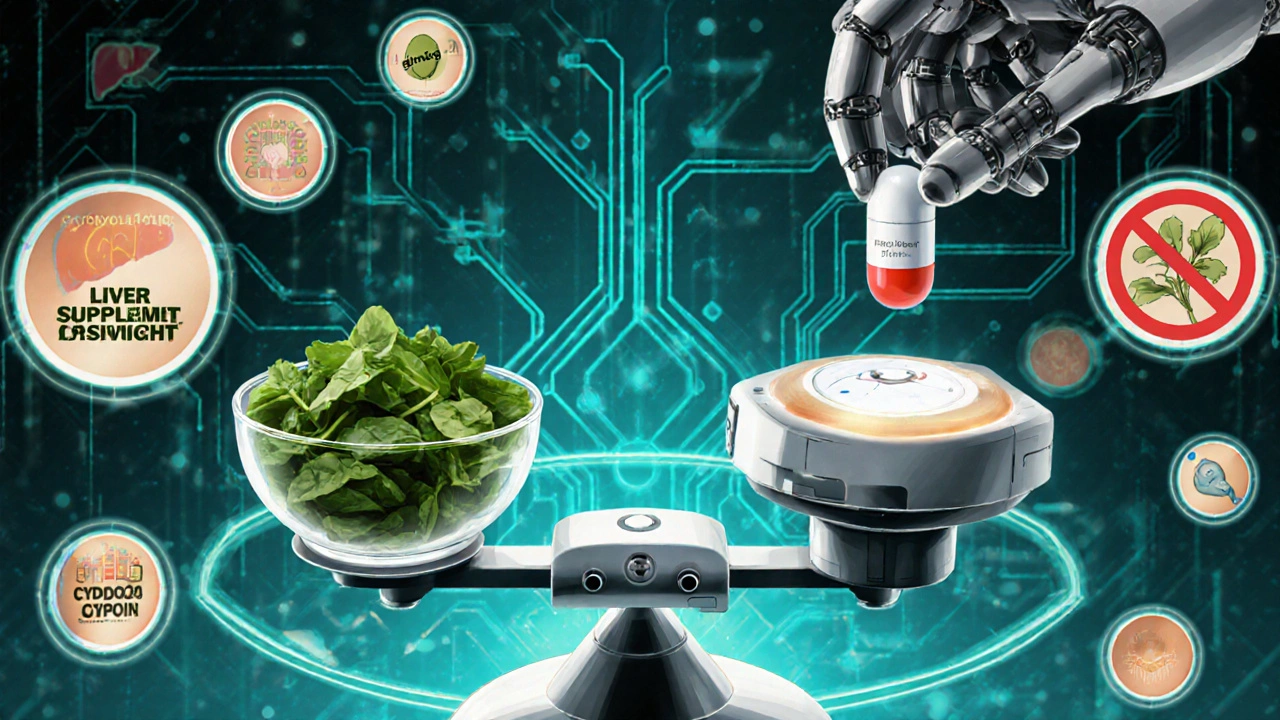Warfarin saves lives. It prevents deadly blood clots in people with atrial fibrillation, mechanical heart valves, or a history of deep vein thrombosis. But for every person who stabilizes on it, another ends up in the ER because of an unexpected interaction. The problem isn’t the drug itself-it’s how easily food, supplements, and even common antibiotics throw its balance off. If you’re on warfarin, your daily choices matter more than you think.
How Warfarin Works (And Why It’s So Sensitive)
Warfarin doesn’t thin your blood. It blocks vitamin K from helping your liver make clotting factors. That’s why it works. But here’s the catch: your body needs vitamin K for other things too-bone health, artery function. So if you suddenly eat a huge plate of kale or start taking a vitamin K supplement, your INR drops. Too much vitamin K, and warfarin loses its power. Too little, and you risk bleeding.
It’s not just vitamin K. Warfarin is broken down by liver enzymes-mainly CYP2C9 and CYP3A4. Anything that messes with those enzymes changes how fast your body clears the drug. A single pill of fluconazole can make warfarin stick around 50% longer. That’s not a theory. That’s what happens in real patients.
The goal? Keep your INR between 2.0 and 3.0. For some, like those with mechanical mitral valves, it’s 2.5 to 3.5. Go above 4.0? Bleeding risk spikes. Below 1.8? Clots form. And you won’t feel it until it’s too late.
Foods That Change Your INR-And How to Handle Them
Vitamin K is the biggest dietary player. It’s in leafy greens, cruciferous veggies, and some oils. But it’s not about avoiding them-it’s about consistency.
- 1 cup cooked spinach = 1,062 mcg vitamin K
- 1 cup cooked kale = 1,062 mcg
- 1 cup cooked broccoli = 220 mcg
- 1 cup raw lettuce = 30 mcg
- 1 tablespoon olive oil = 10 mcg
If you normally eat one serving of spinach a day and suddenly eat three, your INR could drop 1.0 point in under a week. That’s not speculation. That’s documented in NHS guidelines. The fix? Pick one serving a day, at the same time, and stick to it. No need to go vegan or eat only iceberg lettuce. Just be predictable.
Other foods to watch:
- Green tea - Contains vitamin K and may reduce warfarin effectiveness. One patient reported INR dropping from 2.8 to 1.9 after daily green tea consumption.
- Cranberry juice - Anecdotally linked to bleeding, though studies are mixed. Better safe than sorry-avoid large amounts.
- Alcohol - More than 2 drinks a day increases bleeding risk 3.2 times. Binge drinking is dangerous. Even moderate daily use can affect liver enzymes.
- Mango - Rare, but documented cases show it can raise INR. No one knows why. If you love mango, monitor your INR after eating it.
Don’t panic. You don’t have to give up your favorite foods. Just keep your intake steady. If you’re going on vacation and plan to eat a lot of salads, tell your doctor. They can adjust your dose ahead of time.
Supplements That Can Be Dangerous
Just because it’s natural doesn’t mean it’s safe with warfarin. Many supplements interfere with clotting or liver metabolism.
- Garlic supplements - Can increase bleeding risk. Even 1,000 mg daily has been linked to INR spikes.
- Ginkgo biloba - A blood thinner itself. Combined with warfarin, bleeding risk rises sharply. The American Heart Association lists it as a high-risk interaction.
- St. John’s Wort - Speeds up warfarin metabolism. INR can drop within days. One study showed a 50% reduction in warfarin levels after just one week.
- Coenzyme Q10 - Structurally similar to vitamin K. May reduce warfarin’s effect. Not proven in all cases, but enough reports to avoid it unless your doctor approves.
- Vitamin E - High doses (over 400 IU) can increase bleeding. Stick to the RDA (15 mg).
- Omega-3 fish oil - In high doses (over 3 grams/day), it may add to bleeding risk. Lower doses (1 gram) are usually fine, but monitor INR.
Here’s what you need to do: Never start a new supplement without telling your anticoagulation clinic. Even something as simple as a multivitamin can contain vitamin K or other hidden ingredients. Read labels. Ask your pharmacist. Keep a list of everything you take.

Prescription Drugs That Interact-And What to Do
Warfarin has over 300 known drug interactions. That’s 10 times more than newer anticoagulants like apixaban or rivaroxaban. Some are obvious. Others sneak up on you.
High-risk drugs:
- Antibiotics - Especially trimethoprim-sulfamethoxazole (Bactrim) and fluconazole (Diflucan). Bactrim can raise INR by 2.0 points in 48 hours. One patient had to go to the ER three times after taking it for a UTI.
- Amiodarone - Used for heart rhythm problems. It can increase warfarin levels by up to 70%. Dose reductions of 30-50% are often needed.
- NSAIDs - Ibuprofen, naproxen, diclofenac. These irritate your stomach lining and make bleeding more likely. Use acetaminophen (Tylenol) instead.
- SSRIs - Fluoxetine, sertraline, citalopram. They interfere with platelet function and can increase bleeding risk.
- Phenytoin, carbamazepine - Seizure meds that speed up warfarin breakdown. INR drops fast. Requires close monitoring.
- Statins - Simvastatin and lovastatin are metabolized by the same liver enzyme as warfarin. Can increase bleeding risk. Atorvastatin and pravastatin are safer.
If you’re prescribed a new medication, ask: “Will this interact with my warfarin?” Don’t assume your doctor knows. Many don’t. Use the American Society of Hematology’s interaction checker. Print the list. Bring it to every appointment.
Why DOACs Are Taking Over-But Warfarin Still Matters
Newer drugs like Eliquis and Xarelto don’t need frequent blood tests. They have fewer food interactions. They’re easier. That’s why prescriptions for warfarin dropped from 35 million in 2010 to 22 million in 2022.
But warfarin isn’t obsolete. It’s still the only option for:
- People with mechanical heart valves (DOACs can cause clots here)
- Patients with severe kidney disease (creatinine clearance under 15)
- Those with antiphospholipid syndrome (DOACs have 2.8x higher clot risk)
- People who can’t afford $6,500 a year for DOACs (warfarin costs $80)
And here’s the kicker: warfarin can be reversed. If you bleed badly, doctors give you vitamin K or prothrombin complex concentrate. With DOACs, reversal is harder, slower, or sometimes impossible.
Real Stories, Real Risks
On Reddit’s r/Warfarin, a top post from a user with 456 upvotes says: “I eat exactly one cup of spinach at 6 PM every day. My INR hasn’t moved in 18 months.” That’s not luck. That’s discipline.
Another user took Bactrim for a urinary tract infection. Her INR jumped from 2.4 to 5.1. She ended up in the ER three times. She survived. But she had to spend weeks recovering.
One man in Adelaide started taking a fish oil supplement for his joints. His INR went from 2.6 to 4.8. He didn’t feel anything-until he woke up with a huge bruise on his thigh. No fall. No injury. Just a supplement he thought was harmless.
These aren’t rare cases. A 2022 survey found 68% of warfarin users had at least one interaction that required medical care. Antibiotics, NSAIDs, and dietary changes were the top three causes.
What You Can Do Today
Staying safe on warfarin isn’t about fear. It’s about control.
- Track your vitamin K intake. Eat the same amount of greens every day. Don’t skip or binge.
- Never start a supplement without checking. Even “natural” ones can be dangerous.
- Always tell every doctor you see that you’re on warfarin. Dentists, ER staff, specialists-they all need to know.
- Use acetaminophen for pain, not ibuprofen. Simple swap. Big difference.
- Limit alcohol to 1-2 drinks a day. More than that? High risk.
- Get your INR checked on time. Even if you feel fine. Stability is everything.
- Keep a written list of every medication and supplement you take. Update it every time something changes.
If you’re thinking about switching to a DOAC, talk to your doctor. But if you’re stable on warfarin, cost-effective, and have a good monitoring system, there’s no rush. Just be smart.
Frequently Asked Questions
Can I eat leafy greens if I’m on warfarin?
Yes-but keep your intake consistent. Eating a lot one day and none the next will make your INR swing. Pick one serving of spinach, kale, or broccoli per day, at the same time, and stick to it. Your doctor can adjust your dose if your diet stays steady.
Is cranberry juice dangerous with warfarin?
The evidence is mixed, but many cases link cranberry juice to increased bleeding risk. It’s not proven in large studies, but enough patients have had problems that doctors advise avoiding large amounts. A glass occasionally is likely fine. A bottle daily? Skip it.
Can I take ibuprofen for a headache while on warfarin?
No. Ibuprofen and other NSAIDs increase bleeding risk and can irritate your stomach lining. Use acetaminophen (Tylenol) instead. It doesn’t interfere with warfarin and is safe at normal doses.
Why do I need to get my INR checked so often?
Warfarin’s effect changes with diet, medications, illness, and even your liver function. Your INR can swing in days. Checking it every 4 weeks (or more often if you’re new to the drug) catches problems before you bleed or clot. Once you’re stable, you might go longer-but never skip a test without your doctor’s okay.
Are there any new tests to help manage warfarin better?
Yes. In 2023, the FDA approved a genetic test called Warfarin GenAssist. It checks your CYP2C9 and VKORC1 genes to predict how you’ll respond to warfarin. This can cut the time to reach a stable dose by over two weeks. It’s not for everyone, but if you’ve struggled to stabilize, ask your doctor about it.
Next Steps
If you’re on warfarin, your next appointment is your most important one. Bring your supplement list. Write down any recent changes in diet or meds. Ask: “Is there anything I’m doing that could be affecting my INR?” Don’t wait for a problem. Stay ahead of it.
Warfarin isn’t outdated. It’s powerful. But it demands respect. The people who do well on it aren’t lucky. They’re careful. They track. They ask questions. And they never assume something is safe just because it’s natural or over-the-counter.


Noel Molina Mattinez
November 18, 2025 AT 01:09Dave Feland
November 18, 2025 AT 02:23Ashley Unknown
November 19, 2025 AT 11:06Georgia Green
November 19, 2025 AT 19:50Eva Vega
November 20, 2025 AT 08:03Matt Wells
November 20, 2025 AT 15:28Margo Utomo
November 21, 2025 AT 13:04George Gaitara
November 21, 2025 AT 22:43Deepali Singh
November 23, 2025 AT 04:02Sylvia Clarke
November 23, 2025 AT 12:04Jennifer Howard
November 24, 2025 AT 09:41